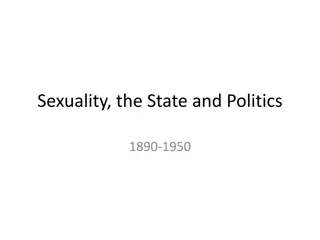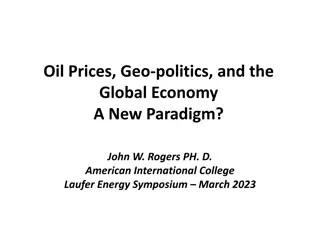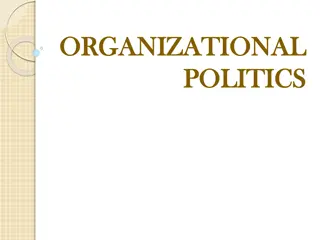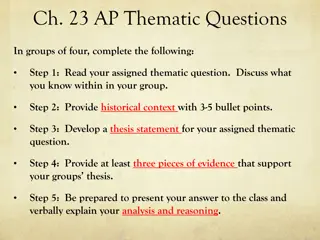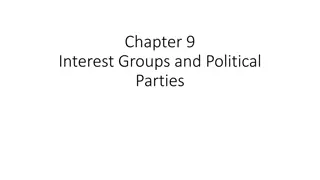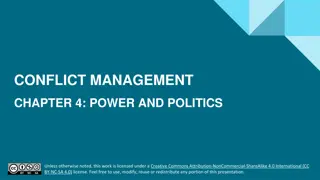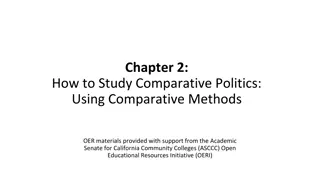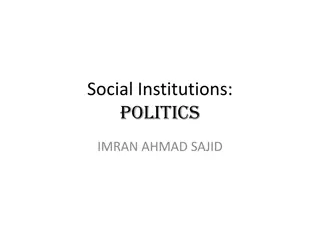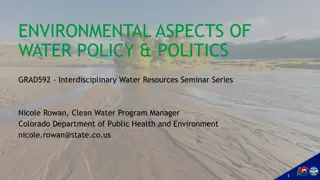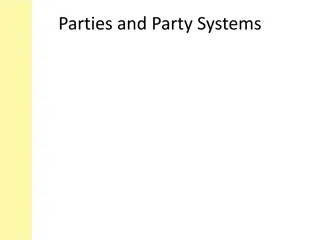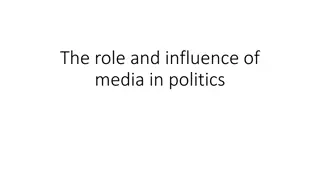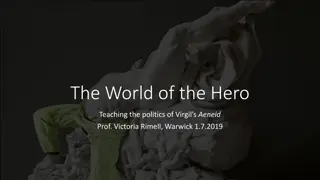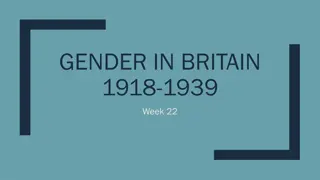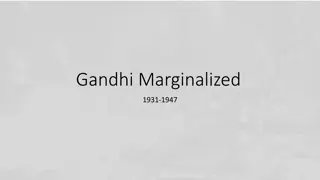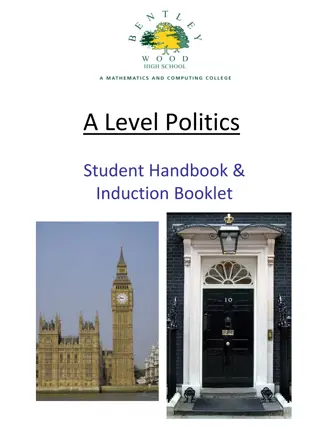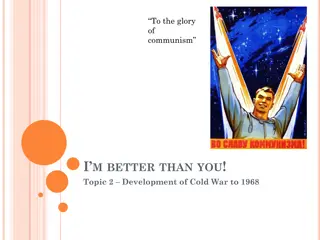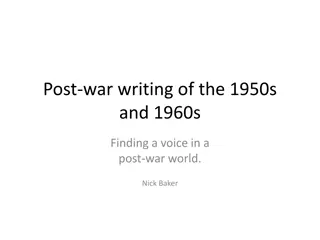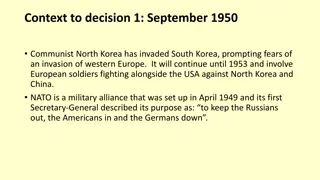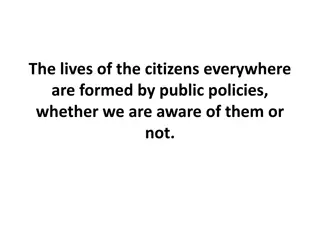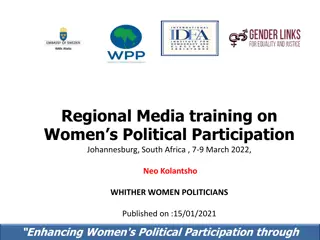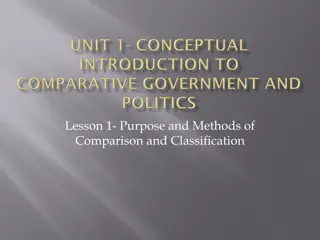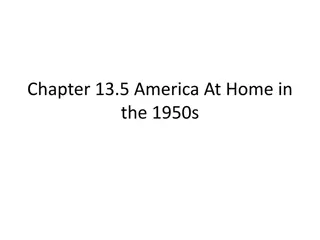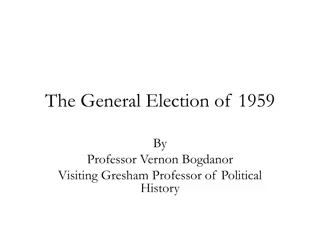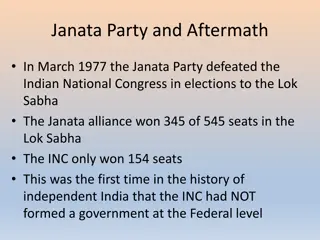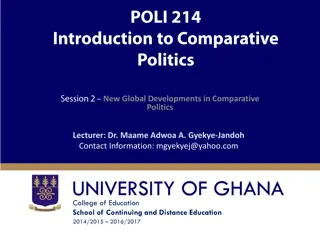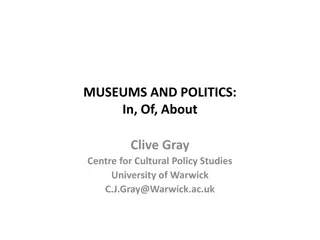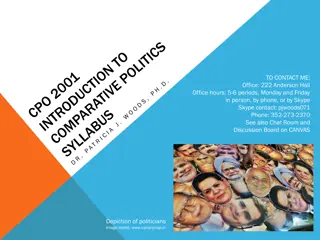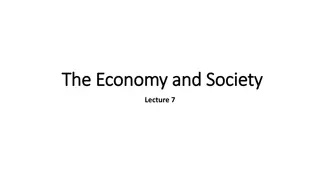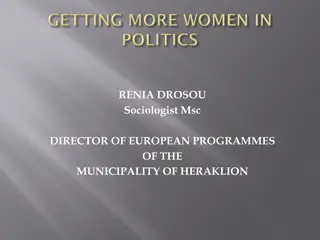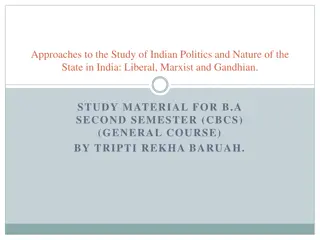Perspectives on Sexuality, State, and Politics 1890-1950
Explore the complex dynamics of sexuality, state power, and political influences between 1890-1950 through historical images and quotes. This collection delves into issues such as lynching and the sexualization of Southern politics, the marginalization of homosexual individuals, and the management o
1 views • 25 slides
Global Energy Dynamics: Oil Prices, Geo-politics, and Economic Shifts
Explore the interplay between oil prices, geo-politics, and the global economy in a new paradigm. Key themes include the dominance of fossil fuels, challenges in transitioning to renewables, and the impact of geopolitical events on energy markets. Dive into discussions on the Ukraine war's effects,
4 views • 36 slides
ORGANIZATIONAL POLITICS
Organizational politics involves informal efforts to influence, align interests, and allocate resources, leading to consequences like stress and decreased performance. Individual and organizational factors play crucial roles in shaping these dynamics.
0 views • 13 slides
Industrialization and Its Impact on Politics and Society in Western Europe
Industrialization spread through Germany and western Europe in the late 19th century, bringing about significant changes to politics and society. Governments implemented reforms to improve workers' lives, consumerism influenced the middle class and working people, and mass political movements aimed
0 views • 23 slides
Terrorism: A Global Threat in International Politics
The rise of terrorism as a global menace is a significant factor in contemporary international politics. Fueled by advancements in technology and ideology, terrorism poses a formidable challenge, exemplified by events like the 9/11 attacks. Efforts are needed to combat terrorism on both national and
0 views • 24 slides
Understanding Interest Groups and Political Parties in American Politics
Interest groups play a significant role in American politics, aiming to influence government decisions through lobbyists and various strategies. They represent different interests such as economic, public, and intergovernmental. Lobbyists engage with federal branches and judicial institutions, utili
0 views • 7 slides
Understanding Power, Politics, and Conflict Management in Organizations
Explore the dynamics of power, authority, leadership, and politics within organizations, delving into how individuals and groups influence each other's actions and decisions. Learn about the various bases of power, common power tactics, and ethical considerations in using power and politics in the w
3 views • 23 slides
Understanding the Scientific Method in Comparative Politics
Exploring the scientific method in political science and comparative politics reveals the systematic approach to acquiring knowledge through observation, hypothesis testing, and analysis of outcomes. Adherence to rules of inference is crucial for validity in scientific research, enabling researchers
0 views • 28 slides
Understanding Politics and Social Institutions
Politics is the social institution responsible for power distribution, goal-setting, and decision-making in society. Every society is built on power, with government being the formal organization that directs political life. Governments strive to establish authority perceived as legitimate by the pe
0 views • 21 slides
Environmental Aspects of Water Policy and Politics Seminar Series
Explore the environmental aspects of water policy and politics in Colorado through a seminar series led by Nicole Rowan, the Clean Water Program Manager. Learn about the mission of the Water Quality Control Division, the history of key acts, such as the Clean Water Act, and the regulations and penal
0 views • 17 slides
Understanding Party Systems in Comparative Politics
Parties in comparative politics play a crucial role in deepening democracy, connecting political society with the State, and maintaining accountability. The definition of a party can be categorized based on normative, motivational behavior, and operational perspectives. The development of party syst
0 views • 16 slides
The Role and Influence of Media in Politics
Media plays a crucial role in shaping opinions, informing, educating, entertaining, and advertising to the public. Traditional forms like newspapers have seen a decline in circulation, while new technologies such as social media are rapidly changing the landscape. Newspapers still hold power in UK p
1 views • 20 slides
Institutionalization of Politics in Service Delivery: A Thought-provoking Analysis
This content delves into the institutionalization of politics in service delivery, examining issues of politicization, depoliticization, and the impact on society. Through insightful discussions, it highlights the challenges and complexities faced in ensuring effective service delivery within the po
0 views • 10 slides
Perceptions of Patron-Client Politics on Corruption in Papua New Guinea: A Research Proposal
Investigate the impact of patron-client politics on corruption in PNG to understand its effects on civil service and governance. Analyze traditional and modern systems to identify prevailing patronage types and their influence on corruption. The study aims to redefine corruption in the PNG context f
0 views • 24 slides
Exploring the Politics and Ideals in Virgil's Aeneid
Delve into the complexities of divine intervention, Roman values, and Augustan heroism in Virgil's Aeneid. Unravel the intricate relationship between politics, epic form, and the subversive readings of this classical work. Challenge traditional interpretations and ponder the nuanced interplay of pro
0 views • 11 slides
Evolution of Media Influence on Politics
The evolution of mass media and its impact on politics is explored, highlighting the important role of media events, high-tech politics, and the development of media politics through print and broadcast media. The government regulation of the broadcast media, as overseen by the FCC, is also discusse
4 views • 20 slides
Understanding the Role of Interest Groups in Politics
Interest groups are organizations with shared policy goals that influence the policy process. They differ from political parties as they focus on specific policies. Theories of interest group politics include pluralist, elite, and hyperpluralist perspectives. Hyperpluralism suggests that groups beco
0 views • 22 slides
Approaches to Study Comparative Politics: Traditional vs. Modern Perspectives
This chapter discusses the importance of approaches in the study of comparative politics, categorizing them into traditional and modern perspectives. Traditional approaches include philosophical, historical, and traditional institutional approaches, highlighting their strengths and limitations. Mode
0 views • 7 slides
The Impact of Female Suffrage on Interwar Politics in Britain (1918-1939)
The period between 1918 and 1939 in Britain saw significant changes in politics, feminism, and society due to the granting of female suffrage. The Representation of the People Act of 1918 led to a flurry of legislation aimed at improving the status and welfare of women, such as the Sex Disqualificat
0 views • 14 slides
Gandhi's Marginalization in Indian Nationalist Politics from 1931-1947
The 1930 Salt Satyagraha propelled Gandhi into the heart of nationalist politics, challenging colonial rule. However, by the end of the decade, the tide shifted away from his influence towards a more conventional political landscape dominated by power negotiations and elections, leading to Gandhi's
4 views • 11 slides
Insights into Canada's Atomic Energy and the Arms Race
Delve into the historical landscape of atomic energy in Canada, tracing its evolution from the early years to the political dynamics surrounding nuclear weapons during the Cold War. Explore key events such as the UN Atomic Energy Commission, Canada's industrial developments in the 1950s, and the int
0 views • 16 slides
A-Level Politics Student Handbook & Induction Booklet
A Level Politics aims to provide a balanced education in politics and understanding of the UK's political landscape. The course covers basic political ideas, structures, and processes, as well as global politics topics like global governance and regionalism. To succeed, students must engage with cur
0 views • 13 slides
The Cold War Rivalry: 1950s-1960s Espionage and Arms Race
The period from the 1950s to the 1960s was marked by intense competition between the Soviet Union and the US in the realms of espionage, space exploration, and nuclear armament. The Cold War rivalry led to significant advancements in technology and heightened tensions, culminating in key events like
0 views • 7 slides
Post-War Reflections: Voices and Identities of the 1950s and 1960s
Exploring the themes of post-war literature from the 1950s and 1960s, this analysis delves into the tensions, crises, and identities shaped by the era. Writers of the time grapple with finding a voice that reflects the uncertainty of a changing world order, encompassing disillusionment, anger, and i
0 views • 16 slides
Various Definitions of Politics and Their Significance
Scholars have struggled to define politics universally, leading to various definitions highlighting its nature and scope. Definitions range from politics as the art of possible to the struggle for power and the governing of men. Each definition sheds light on different aspects of politics, such as t
0 views • 17 slides
European Defence Treaty Negotiations in the 1950s
In the 1950s, the proposal for a European Defence Treaty faced challenges and differing opinions among European countries and the USA. The Korean War, fears of Soviet threat, and the role of NATO influenced discussions. The evolution of negotiations, including debates on West German rearmament and t
0 views • 6 slides
Evolution of Public Policy: From Seeds Sown in 1940s to Academic Discipline in Social Science
The lives of citizens are shaped by public policies, often unnoticed. The analysis of current public policy in America carries a unique 20th-century essence. Beginning in the 1940s, these policy seeds have profoundly influenced government and academic institutions. By the early 1950s, public policy
0 views • 6 slides
The Politics and Ethics of Knowledge Production in Migration Studies by Sari Hanafi
This insightful study delves into the politics and ethics surrounding knowledge production in migration studies. It explores the normativity of migration studies, identity politics, and universalism, while emphasizing the importance of ethics and epistemic community. The discourse also touches upon
0 views • 16 slides
Empowering Women in Politics: Overcoming Financial Barriers
Addressing the financial challenges hindering women's political participation, this story advocates for funding initiatives to support female candidates. By highlighting the barriers faced, it urges for assistance such as subsidies and dedicated funding to encourage more women to enter politics. The
0 views • 10 slides
Comparative Government & Politics Course Overview
Explore the purpose and methods of comparison and classification in the AP Comparative Government & Politics course. Understand the importance of studying diverse political systems such as those of the United Kingdom, Russia, China, Nigeria, Mexico, and Iran. Engage in country fact sheets, multiple-
0 views • 19 slides
The 1950s in America: Post-War Prosperity and Social Changes
America in the 1950s experienced a period of post-war prosperity marked by a significant increase in consumer culture, suburban growth, and corporate life changes. The era saw a booming economy, the Baby Boom generation, suburban expansion, and shifts in gender roles. However, challenges such as rac
0 views • 18 slides
General Elections of the 1950s: A Political Overview
The General Elections of the 1950s saw significant shifts in power between the Conservative and Labour parties in the UK. In 1951, the Conservatives narrowly won over Labour, while in 1955 and 1959, they secured more decisive victories. The swing towards the Conservatives in each election reflects c
0 views • 4 slides
Understanding Comparative Politics: Power, Influence, and Political Phenomena
Politics involves power and influence, where individuals strive to achieve their goals by influencing others or breaking free from external influences. Political science delves into the study of power and political phenomena, while comparative politics focuses on analyzing political dynamics within
0 views • 21 slides
The Janata Party Era in Indian Politics: A Snapshot of Change and Challenges
The Janata Party's rise and fall in Indian politics from 1977 to 1980 marked a significant shift as it defeated the long-standing Indian National Congress. The alliance faced internal struggles, including leadership disputes and corruption charges that led to its downfall. Despite its short duration
0 views • 10 slides
New Global Developments in Comparative Politics Since the 1980s
The lecture by Dr. Maame Adwoa A. Gyekye-Jandoh explores new global developments in Comparative Politics since the 1980s, covering topics like rapid industrialization in Asia and the collapse of communism in the Soviet Union and Eastern Europe. Students are introduced to key concepts such as the Com
0 views • 20 slides
Politics in Museums: A Comprehensive Exploration
Delve into the realm where museums and politics intersect, examining the dynamics of power, ideology, legitimacy, and rationality. Discover how politics operates within museums, addressing who the key actors are, the subjects of engagement, societal interest levels, and the specific arenas where dec
0 views • 10 slides
Understanding Comparative Politics: Field Overview and Specializations
Comparative politics involves studying domestic politics across different states and nations, with a focus on comparison and analysis. The field distinguishes itself from American Politics, International Relations, and Foreign Policy, emphasizing an in-depth look at state-society dynamics within spe
0 views • 27 slides
Understanding the Interplay of Economy, Politics, and Society
Exploring the connections between politics, economy, and society, this lecture delves into the influence of economic systems like capitalism and socialism on political structures. It discusses how economic conditions shape politics and social divisions, emphasizing the intertwined nature of these as
0 views • 15 slides
Evolution of Women's Political Rights in Greece: A Historical Overview
The journey of Greek women to gain suffrage rights, from the first municipal elections in 1934 to prominent figures entering Parliament in the 1950s and beyond. Key milestones include the feminist movement, the struggle for equality, and the election of the first woman MP and mayor. The narrative cu
0 views • 25 slides
Approaches to Study of Indian Politics: Liberal, Marxist, and Gandhian Perspectives
Political Science encompasses various approaches such as Liberal, Marxist, and Gandhian for studying Indian politics. Scholars have explored the nature of the Indian state post-independence, focusing on democratization, social heterogeneity, and class dynamics. The Marxist approach views the state a
0 views • 14 slides
